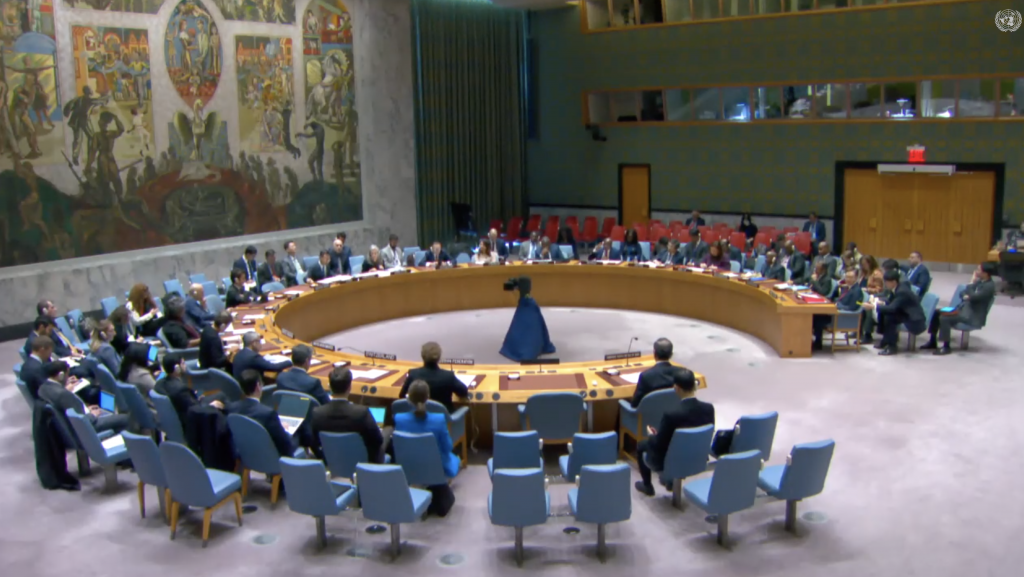Statement by Deputy Permanent Representative Anna Evstigneeva at UNSC briefing on the situation on the Korean Peninsula
Mr.President,
We closely followed the briefing by ASG Khiari. We welcome Permanent Representatives of the DPRK and the Republic of Korea to this meeting.
Russia is concerned about the rapidly unfolding new round of escalation on the Korean peninsula. Over the past few months, we have heard regular alarmist signals from Washington and its allies in the region about the DPRK building up a ballistic program to pose threats to their national security. The US delegation would use every opportunity to convene UNSC meetings in order to portray itself almost as a victim of a situation that they allege was created solely by Pyongyang.
However, let us extend the scope of today's topic a little and look at the current state of affairs in the region as a whole. In March, we already drew the Council's attention to the bellicose maneuvers by the United States, Japan and the Republic of Korea, which were conducted in the immediate vicinity of the DPRK's borders. Even then, the military exercises ‘Freedom Shield’ and ‘Ssang Yong’ that the allies convened under the lead from Washington assumed a striking scale. It seemed to many that the region had neared a dangerous line, which, once crossed, would reduce to a zero the possibilities for a political settlement.
Unfortunately, no right conclusions have been drawn since then, and the US continues with its record-setting demonstration of its military power thousands of kilometers from national borders. So far this year, the allies have already conducted six joint exercises with the direct participation of the US armed forces. Let’s look at the most recent of them. On November 15, two US B-52H strategic bombers arrived at the peninsula for the second time in a month. On November 16, another major exercise between the US and ROK navies took place in the Sea of Japan. Heavy offensive weapons, including destroyers, fighter jets and helicopters, were involved. On November 21, a US carrier strike group led by the aircraft carrier Carl Vinson visited the port of Busan. This came just a month after another US aircraft carrier, the Ronald Reagan, visited the port. I look forward to hearing from the United States delegation to what extent these actions are consistent with the requirement of paragraph 28 of UNSC resolution 2397 that calls to work to reduce tensions on the Korean peninsula and beyond.
Mr.President,
The Security Council convenes today in connection with the launch of a reconnaissance satellite from the DPRK territory, which caused an extremely painful reaction in the West. Russia does not support steps by either side that run counter to the objectives of establishing long-term peace in the region. At the same time, when assessing this news, we suggest paying attention to the fact that as early as November 7, all learned about Seoul's plans to launch its first reconnaissance satellite from the US Vandenberg Base at the end of the month.
Besides, it is worth noting that the government of the Republic of Korea decided to partially suspend, as a "retaliatory measure", the 2018 inter-Korean military agreement, which plays an important role in maintaining stability and preventing armed incidents along the military demarcation line. Such steps could not but provoke a backlash.
We are also concerned about conflicting signals from US allies in North-East Asia, Tokyo and Seoul, about so-called enhanced cooperation with Washington in the nuclear area, which could well be interpreted as an assumption of the possibility of deploying US nuclear weapons on their territory and developing such weapons of their own. By the way, today the UN Secretariat failed once again to give a proper assessment to these provocative steps.
Russia has consistently advocated a peaceful settlement of the entire set of problems on the Korean peninsula exclusively by political and diplomatic means, without external pressure or blackmail. The Russian-Chinese draft political and humanitarian resolution of the UN Security Council is still on the table. If adopted, it can become a truly constructive contribution of the Security Council to resolving the current complex situation on the Korean peninsula.
Mr.President,
Today, several delegations accused Russia of "illegal" military-technical cooperation with the DPRK. These allegations are groundless. Russia fulfils its international obligations responsibly. This does not prevent us from developing traditional relations of friendship and cooperation with our neighbors (including the DPRK) which have firm historical roots. Behind the attempts to vilify Russia in the context of the situation on the Korean peninsula is a desire to divert the Council's attention from the real underlying causes of instability in the region, which are linked to the United States' ambitions to strangle Pyongyang at any cost.
Taking a broader look at the situation, it becomes obvious that Washington has virtually no leverage left to influence Pyongyang. This is what the expert community starts to say increasingly often too. However, instead of striving hard to establish influence, is it not time for Washington to think about extending a hand of mutually respectful dialog to Pyongyang? Any task requires incremental steps. So far, however, the steps have been taken in the exact opposite direction.
Mr.President,
We strongly call on the parties to cease dangerous actions that might trigger an escalation into a large-scale conflict. It seems that we witness an endless vicious circle in which the US-led political and military triangle provokes further escalation instead of contributing to the settlement of relations between the neighbors. Against this backdrop, it does not come as a surprise that Pyongyang, which is being “driven into a corner” by the most powerful nuclear power, seeks to take the best possible measures in the interests of self-defense.
We are convinced that endless discussions of DPRK’s violations and subsequent punitive measures is a pointless path. There will be no significant effort to break the current stalemate unless the parties have a genuine interest in ensuring security in the region.
Thank you.
